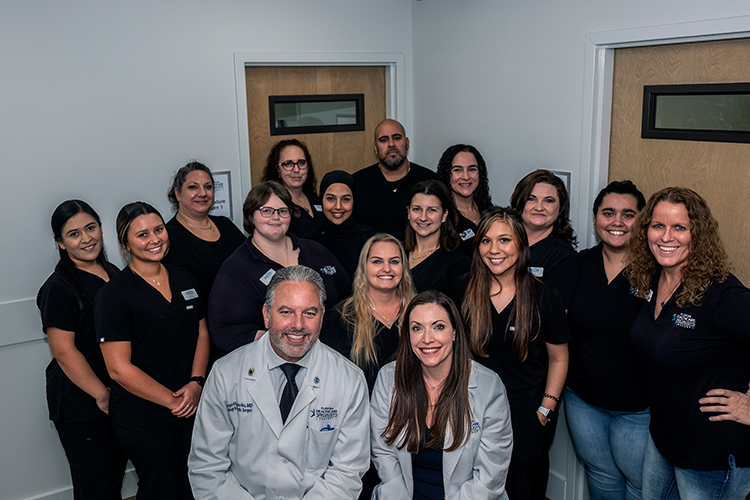
Florida Healthcare Specialists Urology has been sharing their medical office space with Florida Cancer Specialists since 2016. As the patient load increased and more office procedures and services were offered, more space was needed and the practice has now moved into a new suite of offices upstairs from Florida Cancer Specialists.
“We’ve worked together for many years and we have a very unique setting because we have oncologists and urologists,” said Dr. Hugo Davila, a urologist with Florida Healthcare Specialists. “By moving our urology practice upstairs, the oncologists have more room for exams and to provide comfort for patients receiving infusions and we have more room to provide our urology patients with all the care they need.”
“I always tell my patients, family and friends that anytime you see a surgeon it’s good news,” Dr. Davila continued. “If you see an oncologist, the news isn’t as good. But the beauty of our practice is that we work together to provide the best patient care possible, whatever treatment is needed.”
With the expansion, the urology practice now has eight exam rooms, two surgical rooms, and one ultrasound room of its own.
“A lot of people think that urologists only see males, but I am one of the few urologists that treat females as well,” said Dr. Davila. “I have a particular interest in the pelvic floor, which includes any organ in the pelvis that is related to urology. In men that includes problems with the bladder and prostate. In women it includes problems with prolapse of the bladder, rectal seal and vagina. We have the most advanced technology related to treatment and diagnosis.
“Females are diagnosed with an ultrasound and we are one of the few places you can get a 3-D ultrasound evaluation which gives us a 3-D reconstruction of the pelvic floor. This enables me to do a better assessment see which organ is prolapsing.”
The most common urology complaint women have is urinary incontinence caused by a weakness of the pelvic floor muscles. If a patient is leaking when she sneezes, coughs or laughs, it begins to affect her quality of life. Fortunately, there are several procedures to address this problem.
The first line of defense for female incontinence is pelvic floor muscle therapy to provide better support under the urethra. Dr. Davila recommends a 12-week program of contracting exercises with weekly office visits where the contractions are measured with a vaginal probe to see if the contractions are getting stronger. Measurements are scientifically based on metrics, and not just speculation, during the 12-week program. He estimates that 60 percent of patients with mild urinary incontinence improve with these exercises.
More severe leakage can be treated with Bulkamid, a thick permanent gel which is injected into the urethra to add support and reduce the risk of incontinence. The procedure is a series of three to four small injections that take around 10-to-15 minutes in an outpatient setting under local anesthetic. According to Bulkamid’s website, 92 percent of women who received this treatment reported being cured or improved and Bulkamid is clinically proven to deliver symptom relief for up to seven years.
For very severe leakage, surgery in a hospital setting under general anesthesia is recommended. “Basically, we put a mesh over the urethra for added support,” Dr. Davila explained. “The natural way the body prevents leakage over many years is with a ligament behind the urethra, but after vaginal birth and aging that ligament gets loose. The mesh tries to duplicate the ligament. We have a 90-to-95 percent success rate with this procedure and it lasts eight to 10 years.”
The practice has new technology for males as well. As men age, their prostate keeps growing, creating problems like more frequent urination. About 60 percent of the time the condition is treated with medication, but if that isn’t working anymore the next step is an office procedure.
“We have all of the latest technology onsite and several different modalities to treat the prostate. We are the only place on the Treasure Coast, and one of only about six in the country, that does laser procedures in the office setting,” Dr. Davila said. “We prefer to do our procedures in the office unless there is a clinical reason or comorbidity that requires a hospital stay.
“We always opt to provide the less expensive procedure with the best possible outcome and the least complications,” Dr. Davila stated. “Office technology is improving so rapidly that medicine is slowly going away from hospitals and more towards office, home healthcare and prevention.
Our group is investing in our community by bringing the technology to our patients, rather than having our patients travel for technology.
“The beauty of the group our practice is part of is that we are a physicians group. We have about 220 physicians in 110 different offices with each office handled like a private practice. One of the benefits of our size is that when we want to buy the latest technology, we can share the expenses of that purchase with other offices close to us. We are able to adjust to the needs of the community and obtain all this technology by expanding in a smart way.”
After receiving his medical degree from Central University of Venezuela, Dr. Davila was a Clinical Research Fellow at New York Presbyterian Hospital Cornell University and a Postgraduate Research Fellow at the University of California Los Angeles Center of Health and Sciences Department of Urology. He continued his research as a fellow at the University of South Florida in the Sexual Medicine Program in the Department of Urology where he also completed his internship and residency in General Surgery and Urology. He welcomes new patients at his practice located at 3730 7th Terrace in Vero Beach. Call 772-581-0528 to schedule an appointment.



